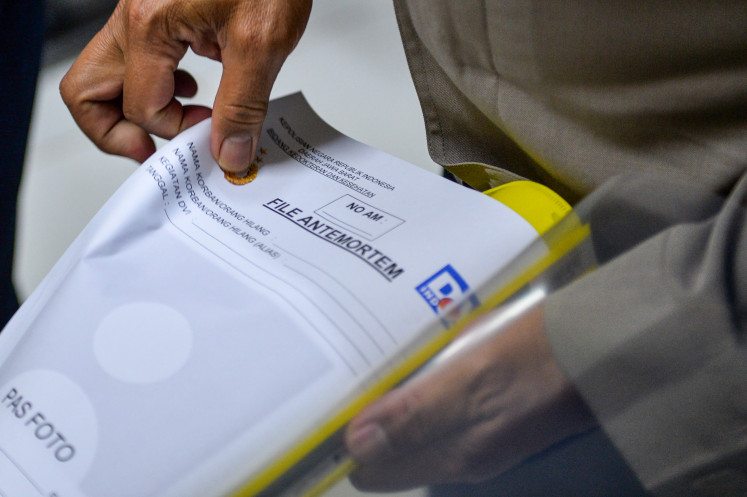Surabaya bombings wake-up call for Indonesia on how to handle IS returnees
The coordinated suicide bombings in Surabaya, East Java, on Sunday have again raised the specter of terror attacks conducted by Indonesians returning from overseas battlefronts
Change text size
Gift Premium Articles
to Anyone

T
he coordinated suicide bombings in Surabaya, East Java, on Sunday have again raised the specter of terror attacks conducted by Indonesians returning from overseas battlefronts.
The first three explosions, which struck three churches across Surabaya on Sunday morning, killed at least 14 people — including six suicide bombers — and injured 41 others. Two attempted bombings were also reported at two other churches in the city. Later that same day, a bomb prematurely went off at a low-cost apartment in the neighboring city of Sidoarjo. The latest attack took place on Monday morning, when a bomb exploded at the entrance of the Surabaya Police headquarters injuring at least six people.
The National Police said three families had perpetrated the East Java suicide bombings and that they had been radicalized by another family who had returned to Indonesia from Syria, large parts of which were controlled by the Islamic State (IS) movement.
The family, who carried out Sunday’s attacks, were divided into three teams. The father, Dita Oeprianto, launched the attack at the Surabaya Pestecostal Church (GPPS) while driving a car. The mother, Puji Kuswati, and their two daughters, aged 9 and 12, blew themselves up at the Indonesian Christian Church (GKI) while their teenaged boys, aged 16 and 18, rode a motorcycle and detonated the bomb at the Saint Mary Immaculate (SMTB) Catholic Church.
Meanwhile, a family of five is believed to be responsible for the bomb attack at the Surabaya Police headquarters. Four suicide bombers were declared dead while an 8-year-old girl, who accompanied them, survived the attack and was taken to hospital.
Speaking at a media conference in Surabaya on Sunday, National Police chief Gen. Tito Karnavian, a former chief of the police’s Densus 88 counterterrorism unit and the National Counterterrorism Agency (BNPT), said 500 Indonesians returned to the country after their involvement in IS campaigns in Syria. They were among more than 1,100 Indonesian who had traveled to Syria to join IS.
“This serves as a challenge for us because the ideology of ISIS is still in their mindset,” Tito said, referring to the other acronym for IS.
Immigration Directorate General spokesperson Agung Sampurno said it was difficult to detect pro-IS returnees because there were no direct flights to or from Syria.
Indonesia does not regard attempts by people who try to join militant groups abroad as a crime and only charges the groups’ supporters with terrorism if they are found to have actually joined and fought with the groups.
A new antiterrorism law and a long-term deradicalization program were the key for officials to deal with Indonesian fighters who returned to the country, experts said.
“The law has yet to be revised after 15 years, during which transnational radical ideologies have entered [Indonesia],” said terrorism expert Al-Chaidar.
“It’s difficult to put them under long-term surveillance,” said Al-Chaidar, adding that the more Indonesian fighters return to the country, the more prone Indonesia was to deadly terror attacks like those in Depok and Surabaya.
Al Chaidar’s insight corresponded with a demand by President Joko “Jokowi” Widodo who said on Monday that the House of Representatives needed to immediately conclude the revision of the antiterror law or he would issue a regulation in lieu of law (Perppu) to empower the state apparatus overseeing terrorism. The revision has been on hold for more than two years after it was first initiated in February 2016 after the Jan. 14, 2016, terror attack on Jl. Thamrin in Central Jakarta.
Al-Chaidar said Indonesia had to ratify the protocol on the list of designated terrorist organizations and it should include Jamaah Ansharud Daulah (JAD) and Jamaah Anshorul Tauhid (JAT).
Tito, the police chief, said the Surabaya bombings might have been related to the recent conviction of Zaenal Anshari — the leader of JAD’s East Java chapter and second-in-command to JAD leader Aman Abdurrahman — for smuggling weapons to Indonesian militants in the southern Philippines.
Other experts believe that the prevailing short-term deradicalization programs carried out by the BNPT are inadequate to deal with IS returnees.
Taufik Andrie, a terrorism expert with the Institute for International Peace Building, said authorities should design a more comprehensive and long-term program to deradicalize returnees and help them re-integrate into society.
“Returnees might feel socially frustrated and angered, so authorities should provide continuous counselling,” said Taufik.









